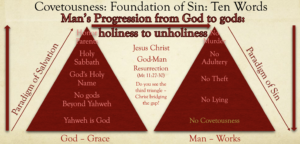Judas Iscariot historically has the
Reputation as the worst sinner ever
Ever since that fateful night of the Last Supper when Judas Iscariot left the gathering to betray Jesus to the Sanhedrin, via the Sadducee priesthood, he has forever become known as the most despicable of all sinners. Yet, if he was this evil would not the other apostles have notice his evilness in his everyday interactions? I postulate that Judas Iscariot was nothing more than an average sinner, like you and I, before salvation.

Pin locates Hebron in Judah
Fifteen miles south of Hebron: Kerioth
First, we need to understand the man through what little information the Bible contains about Judas before this event. His title, Iscariot, is not a last name as many Christians today commonly believe. It is a title. Is, actually the Hebrew ish, simply means man while Cariot identifies where he was from, the small village of Kerioth {Hebrew spelling} about 15 miles south of Hebron which itself was 20 miles south of Jerusalem {See Map}. Judas was given this title to separate him from the other Judah, also an apostle; probably by the gospel writers.

What does a sinner look like that
Foretells his or her depravity?
John provides almost no information concerning Judas Iscariot until he writes about the anointing of Jesus in Bethany by Mary six days before Passover (Jo 12:1-8). Mary, sister of Lazarus, bought a container of expensive ointment and anointed Jesus. She probably anointed both His head and feet, according to both Matthew (Mt 26:6-13) and Mark (Mk 14:3-9); but, John concentrates on her anointing Jesus’ feet. She wept and wiped her tears with her hair, something which had taken place about one year earlier when Jesus had attended another meal in Galilee (Lk 7:36-50). She was showing her repentant love for his gracious act of raising Lazarus from the grave (Jo 11:43-44). At that time she had been publicly prideful and haughty toward Christ whom she blamed for letting Lazarus die. Her repentant change is publicly displayed as she humbled herself to perform this service preparing for His coming death. Her humble act of love contrasts Judas’ haughty claim made against her act of devotion.

First Pyramid is how God Changes Us
Second Pyramid is how sin Works in Us
The foundation of all sin is covetousness (Ja 4:1-3). It is the heart of all sin. Why do people murder? Because they covet something they believe the other person can provide for them or is depriving from them (Ge 4:1-10). Murder is the result of covetousness which is why murder is at the top of the pyramid, relatively rare end point of covetousness, while covetousness is the base of the pyramid since all sin flows from this. Covetousness works through each sinner via the lust of the eyes, lust of the flesh and the pride of life to obtain that which it wants (1Jo 2:15-17). Covetousness is the natural basis for all thoughts, words and behaviors of all sinners; thus, they covet the world making themselves enemies of God since they have rejected God and His morality (Ro 1:18-32; Ja 4:4). If you do not understand this basic fact taught throughout the Bible then you will not understand why John introduced Judas at the Bethany dinner. John wanted everyone to understand why Judas betrayed Christ; covetousness.
Judas became incensed with Mary’s public display of love. He made the charge that Mary misused the expensive ointment for her own selfish interest at the expense of the poor. As an aside, John states that Judas stole money from the common purse further illustrating Judas’ covetousness. Judas was hiding behind piety masking his greed for the money that could have been donated and skimmed for his own purposes. Thus, John has contrasted Judas’ covetous heart in contrast to Mary’s humble, repentant heart. Judas appears more evil because Mary is displayed so lovingly. Yet, what is the true difference between Judas and any other sinner, which would include every single person ever born {you and me}?

The Mirror does not depict reality
It is a tool to hide our sin from ourselves
Every person is the hero of their own story! Even single person sees their worldview and moral standard as the absolute judge of everyone else. This allows each of us to deceive ourselves about our own sinfulness (Mt 7:1-5). Our moral worldview is the mirror we use to see our perception of our goodness. However, God sees the truth of each of us. In His graciousness He reveals our ugly sinfulness to us while enlightening us so that we repent, crying “Abba, father” (Ro 8:15). Judas was exposed to the same teachings and witnessed the same miracles as the other apostles. Yet, it produced no change in him; i.e., he remained in his sin. He did not have a changed heart (1Sa 10:9). His piety toward the poor gave legitimacy to his covetousness hiding it from him. He did not see himself as a terrible sinner because his worldview painted himself as caring for the poor. Does this excuse him? No! He stole from the common purse demonstrating that he was guilty and responsible for his action. He could have seen his sinfulness and asked Christ for forgiveness; instead, he covered it with false compassion.
In reality, this makes him no different from any other sinner in history. We categorize sinners based upon the effects of their actions. We classify someone as a terrible sinner who commits mass murder, tortures people, etc. On the other hand humanity tends to overlook the little white lies, the theft of small items and other behaviors of little consequence. According to man’s standards, Judas’ words against Mary would be considered minor. Yet, when given the right opportunity the same covetousness resulted into something far more heinous, the death of an innocent man for mere gain. Once Judas was confronted with the consequences of his covetousness he was stricken; yet, he could not undo what he had done. In effect, this makes Judas Iscariot just like everyone else. Any man, woman or child born in sin, which is all of us, would do some act that could result in horrendous consequences. Judas was no different from anyone else and we are no different from he.
The Christian, via the power of the Holy Spirit alone, is able to reject the siren call of covetousness. However, because we retain our sinful flesh we all too often live in covetousness masquerading as good intentions, not unlike Judas’ excuse for persecuting Mary. The political climate throughout the world today publicly pushes for equality and welfare for the poor as the excuse to increase the power of the elitist power brokers. The vast majority of the world agrees with the siren song of this piety because they see themselves as recipients of some largess which must be taken from others and given to them. In effect, the excuse of Judas is the excuse of everyone who supports such piety. It is covetousness that finds expression in lust of the flesh to engender hate against those who may have by those who have not earned. Yet, in their own mind, for the vast majority I believe, they justify themselves just as Judas. They do this even though everyday reveals the fruit of their covetousness: violence. From such a small beginning comes such death and destruction at every level of every society. In this respect, it does take a village to make a living hell on earth.

